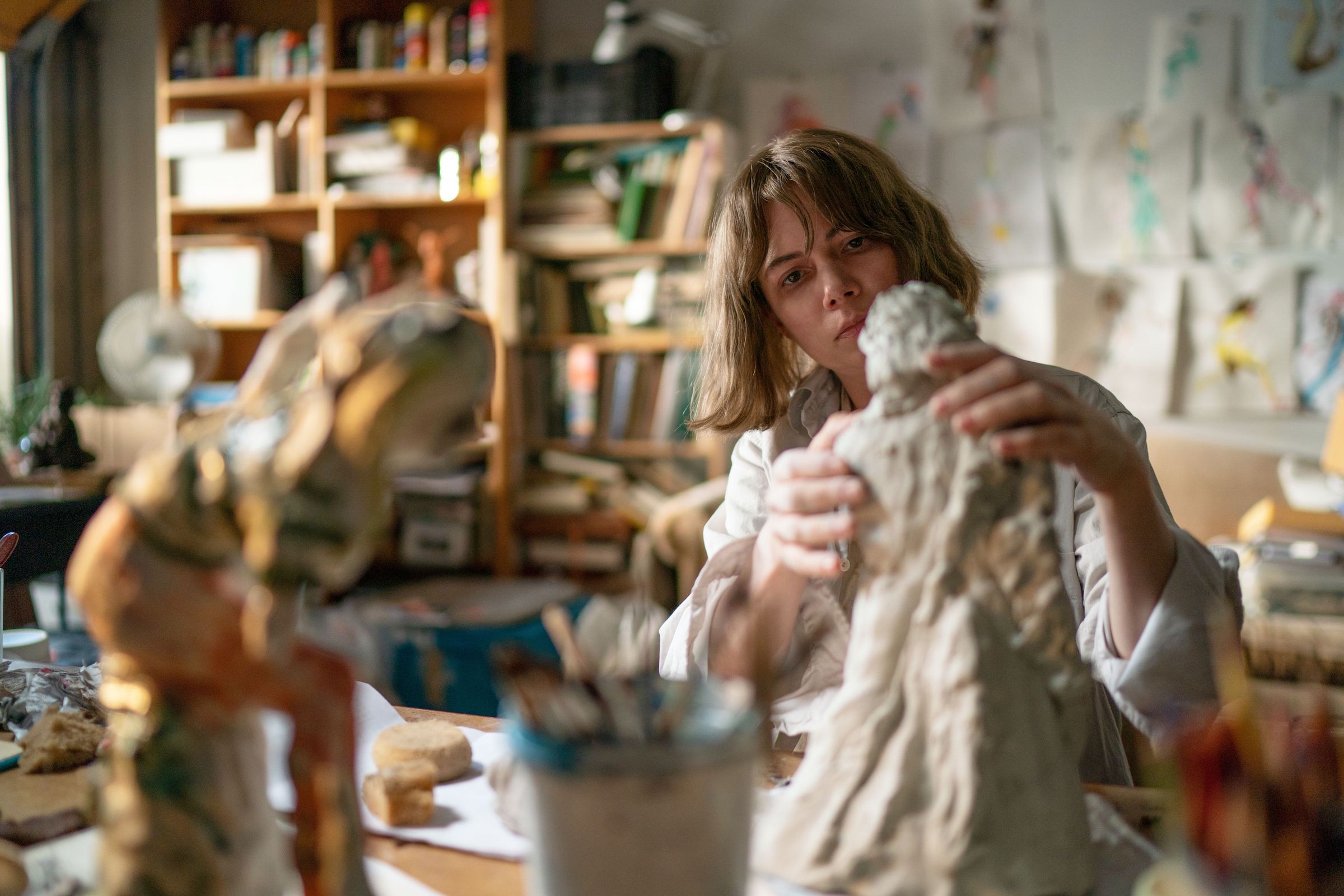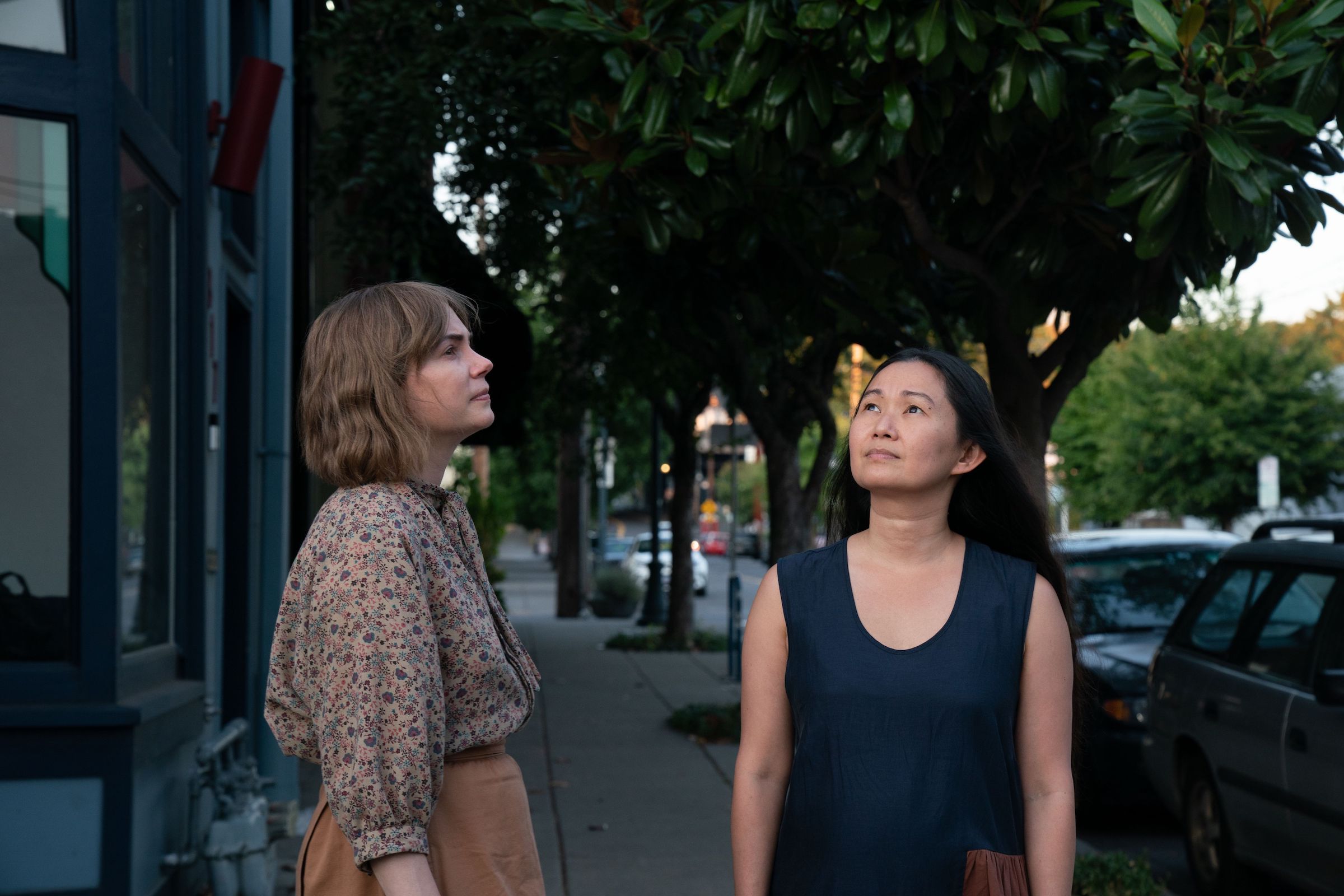
Making anything of value—a work of art, a poem, a solid piece of furniture—demands a deep descent into the self, to the point that it’s easy to neglect the needs of others in your orbit. Stay in the zone too long and there’s a danger of forgetting how to have a simple conversation or make a phone call, of going a little feral. Going into that inner wilderness is great, as long as we can follow the trail of bread crumbs back to the world of human connection.
That’s just one of the ideas at play in Kelly Reichardt’s quietly extraordinary Showing Up, a movie so fine-grained that you’re almost not prepared for the subtle power of its ending—the story is brought to land, almost literally, with the beating of wings. Michelle Williams is Lizzy, a sculptor living in Portland, Ore., and getting ready to mount a small but, for her, important show. Before we even meet her, we see soft watercolor sketches of her ceramic works-in-progress, carefully molded figures of women of all ages who seem to be dancing, or weeping, or possibly both. These works are rounding the bend toward completion, and we watch as Lizzy scrutinizes them, tracing their now hardened contours, as if trying to reclaim with her fingers one last memory of the formerly soft clay. This, in movie form, is one idea of what it’s like to make and think about art; its meaning can seem to pass through our skin, a mysterious vibration.
But like all artists Lizzy is also, whether she wants to be or not, a person living in the world. She has a small studio and living space that she rents from her closest friend, Jo (the remarkable Hong Chau), also an artist, with a personality as breezy as Lizzy’s is thorny: though she too is preparing a local show—two, in fact—she’s happy to spend any spare time she’s got installing a tire swing in the backyard of her small apartment building, rather than addressing the more immediate problem presented by Lizzy’s broken hot-water heater. Lizzy watches, her brow a tiny thundercloud, as Jo twirls in her newly installed swing, living the idea of what we want an artist’s life to be. Everything about Lizzy is coiled tight: What about her hot water? What about her needs? She’s preparing a show too. She stands there, sullen but also perplexed, her arms dangling in her shapeless cotton clothes like a Roz Chast cartoon come to life.

This is the magic of Williams’ performance, playing a woman whose art demands deep inner travel, but whose movement through the everyday world could use some improvement. Retreating into the world of her “girls,” as others refer to her sculptures, is less bewildering to Lizzy than the real life she’s stuck with. She has a dull day job in a small arts college run by her mother Jean (Maryann Plunkett); her father Bill (Judd Hirsch), once a prolific ceramicist, has retreated into a world of flaky hippiedom. She’s also consumed with worry about her brother Sean (played superbly by John Magaro). He may be the biggest genius of the whole gang, but he’s also the most fragile, a semilost soul whose clumsy manners belong to another world.
Lizzy has more moderate problems too: it’s her cat, Ricky, a small orange jerk, who sets the plot in motion with a flick of his paw. Lizzy is bedeviled by all of it, and Williams, a formidable actor, channels her annoyance like a subsonic hum. This is the fourth movie she and Reichardt have made together. They’re simpatico souls; Reichardt (who also co-wrote the script, with her frequent collaborator Jonathan Raymond) couldn’t have made a movie as weird and great and intimate as this one with just anybody. The on-the-surface modesty of Showing Up is a kind of sorcery. It’s in the days afterward, when you’ve left its spell and gone back to the world, that its essence is more likely to take shape—a shape you could almost trace with your thumb, as if it were made of clay and not images, air, and feeling.
More Must-Reads from TIME
- Cybersecurity Experts Are Sounding the Alarm on DOGE
- Meet the 2025 Women of the Year
- The Harsh Truth About Disability Inclusion
- Why Do More Young Adults Have Cancer?
- Colman Domingo Leads With Radical Love
- How to Get Better at Doing Things Alone
- Michelle Zauner Stares Down the Darkness
Contact us at letters@time.com